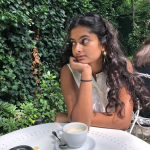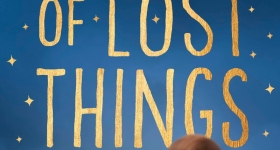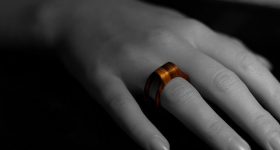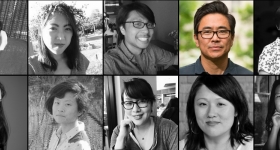On an unsettlingly warm February night in New Haven, my friend Sohum invites me over for dinner. They had promised to make pasta with pesto, a comfort food for us both. And yet, when I arrive at their house, I am greeted by the toasted smell of browning butter: Sohum’s roommate has invited her own friend over, and the two of them are making aloo parathas. It’s not necessary that you know precisely what aloo paratha is, though I am tempted to go into detail over the goodness of salt, butter and carbohydrates united in this familiar North Indian dish. While this food is not one associated with either my or Sohum’s cultures, it is familiar. It is in the midst of its aroma that my friend reports that I am a 2.5 generation Asian American.
Oh, I say. I guess that makes sense.
My mother grew up in Queens but was born in South Asia. My father came to the United States in his early 20s. Thus far, I’ve considered myself to be a 1.5 generation Asian American, which means I didn’t grow up in an ethnic enclave, but I could have. Entry into Asian American spaces often tends to center around those who grew up in ethnic enclaves, so I’ve come to see my experience as outside the expected narrative of Asian Americanness. Especially among South Asians, I sense an expectation that we should find commonality in our historical proximity to those who lived in the subcontinent. I’m just not as close as they are. My friends and I are united this evening by the pleasure of our senses.
//
Minor Feelings, released this month by One World (an imprint of Penguin Random House), is Cathy Park Hong’s collection of hybrid criticism and memoir. It is her fourth book and first book of nonfiction. Random House One World pitched the book as a work intended to “expose fresh truths about racialized consciousness in America.” Critics have compared the book to Claudia Rankine’s Citizen — as an example of hybrid commentary on race in the United States.
The title of the collection comes from a specific emotional landscape that Hong describes in her second essay, which discusses Black comedian Richard Pryor. “Stand Up” is the second essay in the collection. It explains how Hong began to question her relationship to form on the page. Most importantly, though, Pryor made Hong wonder: “What the fuck am I doing here? Who am I writing for?” In Hong’s words, minor feelings are “the racialized rage of emotions that are negative, dysphoric and therefore untelegenic, built from the sediments of everyday racial experience and the irritant of having one’s perception of reality constantly questioned or dismissed.” Indeed, Minor Feelings seems primarily concerned with Pryor's sense of precarity or unsureness. As Hong says in the book’s first essay, “United”, she isn’t sure if what she experiences — family conflicts, astringent interactions with white people — is “not a racial phenomenon but my own damn problem.”
In “United,” Hong talks about American ignorance on the topic of Asian Americans: “They think Chinese is synecdoche for Asians the way Kleenex is for tissues. They don’t understand that we’re this tenuous alliance of many nationalities.” I didn’t find Hong’s ruminations on the inconsistency of the Asian American political identity on which “the paint ... has not dried” particularly revelatory. In “Stand Up” and “United,” for example, Hong expresses her discomfort speaking for Asian America when it is such a diverse and complex group. She doesn’t seem sure that she should be speaking for this group in the first place. “Will we, a pronoun I use cautiously,” says Hong, “solidify into a common collective, or will we remain splintered, so that some of us remain ‘foreign’ or ‘brown’ while others … ‘pass’ into whiteness?” The writing itself is also unsure; it seems uncertain about where it should place itself both in the canon and the political imagination.
Much of the book is preoccupied with the potentials suggested by coulds/woulds/shoulds. To me, Hong’s use of these words suggests that there is a “right” answer to all these concerns, and that this answer simply needs to be found.
But the book, much like Asian Americans on the whole, falters when trying to find this answer. It can’t tell us who we should be, who we could be, even who we would have been had history not happened the way it did. It's impossible to find a single answer, I think. It’s even more impossible that one person, even one as eloquent as Hong, should be able to find this Asian American answer on their own.
Hong’s anthology sings most clearly in the essays that don’t explicitly wrangle with race; I’m inclined to say that while Minor Feelings is pitched as a political manifesto, it is something closer to intricate poetry. The heart of the book is “An Education,” an essay in which Hong talks about two of her Asian/Asian American college friends, Erin and Helen, and their volatile relationships at Oberlin. Describing Helen, Hong says, “Nothing stuck to her, not even an addiction to heroin, which she used and then abandoned after a few months.” In another instance, Hong and Helen get into a physical fight: “When Erin pulled away from me, Helen began punching and kicking as hard as she could.” These friendships seem to embody the precarity and beauty of the Asian American experience. Within these friendships the woulds/shoulds/coulds disappear, replaced instead by what happened and what will happen — in their loss, those in the friendship also lose the insecurity and instability of unknowing; we lose the possibility implicit in this instability of this language, and there seems to be no future options.
“An Education” also historicizes Hong as a subject. She reveals here that her father wanted to be a poet. She reveals her inability to escape her mother in her writing. But what is most beautiful is the way she recounts the way her relationships with her two creative friends drew her away from visual art and towards poetry. The “quotidian moments” that define these friendships are “more life-changing than losing your virginity or having your heart broken.” Hong shows us the import of the quotidian aspects of relationship as she fleshes out a timeline, takes us on flights to South Korea and illustrates the textures of her friend’s sculptures and wary conversations. She doesn’t give us much of the critical race theory that she invokes heavily in many of the other essays, but this is why “An Education” is so strong. It isn’t weighed down by ideas it is trying to communicate; it is made lighter by sharing them. In her friendships, Hong finds answers. “An Education” serves as an allegory for Asian American creatives who are politically various, constantly at work undoing ourselves and one another. It is an intimate and honest portrait of the author, so tender it almost feels a secret shared between close friends.
//
Cathy Park Hong’s Minor Feelings, while interesting, and in some ways, familiar, is not a book made for me. Hong seems deeply aware of the inherent strangeness of writing a book on the topic of Asian Americans even though it is a group of people constructed less as a racial group and more as a continental foil. These days, I find myself constantly confounded simply by how little I know of what the term “Asian American” can constitute. Hong feels similarly. It seems we are most united in feeling invisible in the public eye and in American history. I’m not sure that the collective feeling of not being seen implies that, when actually seen, we should be seen together. Here again we return to the coulds/shoulds/woulds that plague Hong’s book: Should Asian America, as a legitimate political identity, find its reckoning in one collection?
This is a tricky “should.” What I should do and what I choose to do are very different things. Like Hong, I have concerning and unstable friendships and romances, and yet I still choose to re-enter into those relationships. I shouldn’t choose them, but I do. Relationships seem a useful site for locating where we are in the world because they reveal what we do not and cannot handle in other people. There’s no room for discussion in these choices; it is more allied to fate. In “An Education”, we learn the story’s central friendship — between Hong and Helen, not between Hong and Erin — has deteriorated outside the scope of the essay. In the realm of the piece, though, the narrator forgives and challenges her friend. So, too, does she challenge and forgive her own ability to make art, and her ability to participate and contribute to a collective notion of an Asian American identity. This in mind, I look to my own personal friendships to understand Asian America, fragmented as we may be.
//
That February night, hearing Sohum tell me that I’m more generations American than I thought should have been a deeply disruptive revelation for me. But it wasn’t. So much of how I place myself in the world is already so precarious. It wasn’t too strange to hear that my experience of Asian Americanness is not the “normal” experience of Asian Americanness, whatever that may be. I find myself increasingly using my interpersonal relationships as a way of understanding the world simply because they are certain. I don’t think these delicate, unsure words, these shoulds/coulds/woulds are productive for me in the way they may once have been. Perhaps I look to the tender platonic moments because I am a writer, or perhaps because they are the most legible to me politically. My friends make me aloo paratha, and I know where I am at with them. I know where I am with my individual friends. I know where I’ve been, the mistakes I've made. I’m working with them, I think, to craft a vision of where we’re headed. I can’t do it on my own. This is not a should, or would. I will. We will.
My friends make me aloo paratha, and I know where I am at with them. I know where I am with my individual friends. I know where I’ve been, the mistakes I've made. I’m working with them, I think, to craft a vision of where we’re headed. I can’t do it on my own. This is not a should, or would. I will. We will.
This is something Hong and I seem to agree on and perhaps why her bookending polemic essays do not sparkle the way her strictly autobiographical work does. We cannot craft our political identity individually; it’s an impossible task. We have to make them together, and they cannot be traced to one individual’s narrative. A coherent and politically salient notion of Asian America, and our requisite reckoning, cannot be brought about by one person’s story. In Hong’s own effort to do so, she realizes how woefully unprepared for this task she is. She tries to fill the gaps of being an individual with these words of precarity, these woulds/shoulds/coulds. She gives us a basic history of Asians in America. But she doesn’t ground us. Her other essays leave us floating because they don’t offer us the decisive collectivity in storytelling and in life that is necessary for an Asian American reckoning. Our story, our reckoning, has to be the product of the stories of many people, pasted together with glue and paper tape. It’s in our friendships, the things we make together, how we love another, how we fail one another. The story’s there, in the relationships and love we share.










Comments